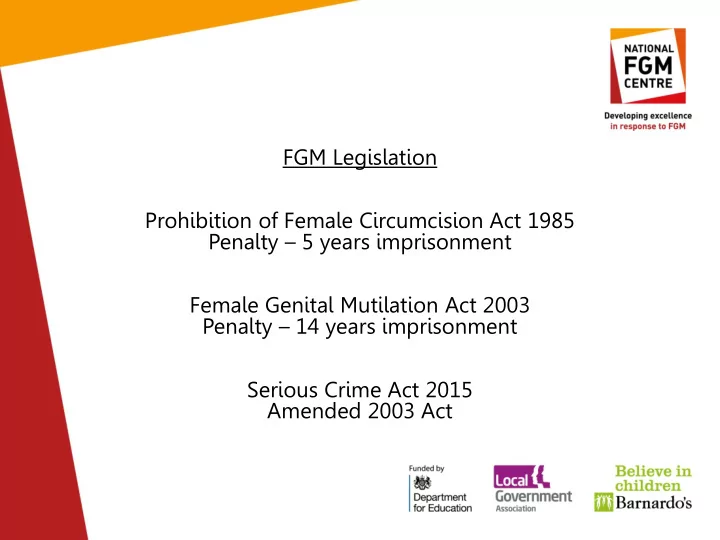

FGM Legislation Prohibition of Female Circumcision Act 1985 Penalty – 5 years imprisonment Female Genital Mutilation Act 2003 Penalty – 14 years imprisonment Serious Crime Act 2015 Amended 2003 Act
Serious Crime Act 2015 • Extends reach of 2003 Act to habitual as well as permanent resident in the UK Person with parental responsibility for the girl • e.g. mothers, fathers married to the mothers at the time of birth, guardians, adult looking after child during summer holidays • Lifelong anonymity for survivors FGM Protection Orders •
Mandatory Reporting Duty The Serious Crime Act 2015 introduced the duty to report female genital mutilation. All regulated health and social care professionals and teachers are now required to report known cases of FGM in girls under 18 identified as part of their work to the police within 1 month. The duty is personal; i.e. the professional who identifies FGM / receives the disclosure must make the report
Who does the duty apply to? • Health and social care professionals regulated by a body which is overseen by the Professional Standards Authority for Health and Social Care including: General Chiropractic Council General Dental Council General Medical Council General Optical Council o General Osteopathic Council General Pharmaceutical Council Health and Care Professions Council (whose role includes the regulation of social workers in England) Nursing and Midwifery Council • teachers - this includes qualified teachers or persons who are employed or engaged to carry out teaching work in schools and other institutions and, in Wales, education practitioners regulated by the Education Workforce Council
What is a ‘known’ case of FGM? 1) Verbally disclosed i.e. a girl under 18 discloses that she has undergone FGM using all accepted terminology (i.e. cut, gudni, sunna, tahor, circumcision) 2) Visually identified i.e. when you see signs/symptoms appearing to show she has had FGM and have no reason to believe it was for the girl’s physical or mental health or for purposes connected with labour or birth. This includes genital piercings and tattoos for non-medical reasons YOU DON’T NEED TO BE 100% CERTAIN FGM HAS BEEN CARRIED OUT
The duty does not apply: • Adult woman (18 and over) has had FGM • Parent/guardian discloses that child has had FGM • You believe a girl is at risk of FGM • You think a girl might have had FGM but she has not disclosed, and you have not seen any signs/symptoms IN THESE CASES YOU NEED TO FOLLOW LOCAL SAFEGUARDING PROCEDURES
What do I need to do ? • Telephone ‘101’, the non -emergency crime number • Discuss with local safeguarding lead and follow normal safeguarding procedures • Make a record of your actions / decisions, and write down the Police reference number • Update your safeguarding lead • Make sure that you / someone with access to all the information is available and prepared to discuss further with the police lead investigator
What do I need to tell 101? explain that you are making a report under the FGM mandatory reporting • duty • Give your details: - name - contact details (work telephone number and e-mail address) - times when you will be available to be called back - role - place of work • Details of your organisation’s designated safeguarding lead: -name - contact details (work telephone number and e-mail address) - place of work • the girl’s details: - name - age/DOB - address • if applicable, confirm that you have undertaken, or will undertake, safeguarding actions.
When should I report? • Call 101 as soon as possible • You should report ASAP with the same urgency as for all other safeguarding cases • You should report by the close of the next working day • If you believe reporting would lead to risk of serious harm to the child or anyone else, contact your designated safeguarding lead for advice. • In exceptional circumstances, you may need a longer timeframe to take action. • The safety of the girl or others at risk of harm is the priority
Should I tell the girl’s parents? YES: In line with safeguarding best practice, you should contact the girl and/or her parents or guardians as appropriate to explain the report, why it is being made, and what it means. Wherever possible, you should have this discussion in advance of/in parallel to the report being made. NO: If you believe that telling the child/parents about the report may result in a risk of serious harm to the child or anyone else, or of the family fleeing the country, you should not discuss it. If you are unsure or have concerns, speak to your designated safeguarding lead.
What else should I do? - Follow standard safeguarding procedures - Follow other professional responsibilities e.g. in a healthcare setting, you would need to respond to the physical and psychological needs of the girl
Failure to Report • Failure to comply may be considered through existing Fitness to Practise proceedings with your regulator • Regulators will, as with all other matters, consider professionals ability currently to practise safely and take into account the circumstances of the case. • The safety of the girl or other individuals at risk of harm is paramount.
Further Information National FGM Centre Knowledge Hub https://barnardosfgm.custhelp.com/app/home Home Office Mandatory Reporting Procedural information https://www.gov.uk/government/publications/man datory-reporting-of-female-genital-mutilation- procedural-information
Contact Details Hekate Papadaki Head of Knowledge Hub and Community Engagement Hekate.papadaki@barnardos.org.uk Mobile: 07701295003
Recommend
More recommend